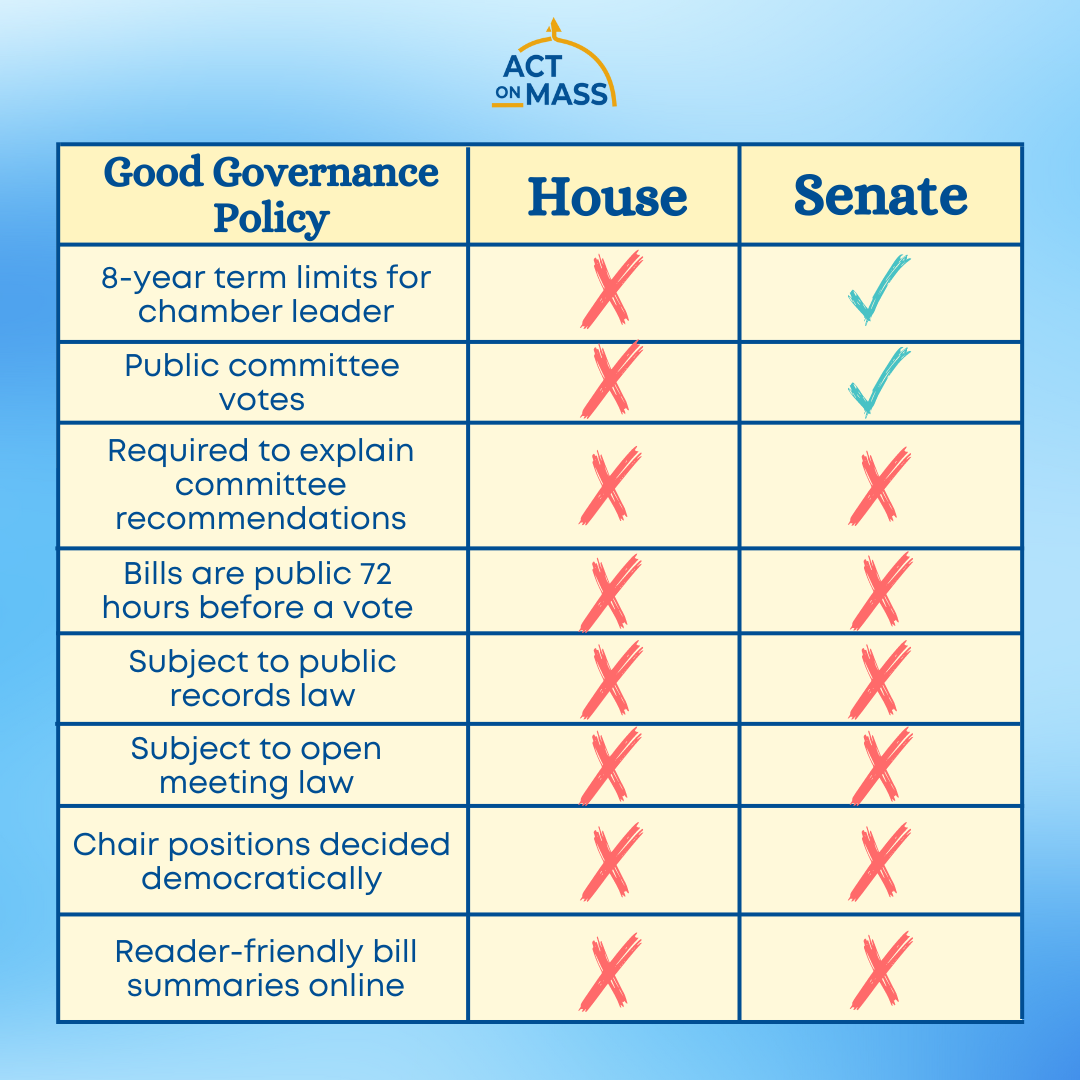
You might have noticed that there hasn’t been much news coming from Beacon Hill since the new session began earlier this month. (Then again, doing nothing newsworthy is kind of the Massachusetts Legislature’s thing.)
That’s because the actual lawmaking process can’t begin until the House and Senate debate and vote on their rules–the nitty gritty procedural document that governs the lawmaking process itself.
The rules debates are likely to take place soon–as early as next week. And since the rules are a key place to codify good governance policies (or lack thereof), it’s our bread and butter.
So, we figured why not dedicate the entirety of this Scoop to the reason for the season: the rules.
State House Scoop
What are the rules? Why do they matter?
The rules are 100+ page procedural documents that, for how incredibly boring they are, can make a huge impact. The rules determine all sorts of things like how far in advance hearings must be scheduled, ethics requirements about when legislators can’t own certain stocks, and what powers the House Speaker and Senate President have.
The rules also determine if, how, and when votes taken in committee need to be made public, and how much time legislators and the public have to read bills before they come to a vote on the floor–two issues at the heart of The People’s House campaign, our cornerstone campaign for transparency and accountability on Beacon Hill.
And why do committee votes matter? I’ll let former State Representatives Jonathan Hecht and Dan Winslow explain–they are far more eloquent than I am. Read their recent op-ed in the Globe about the importance of public committee votes here.
Three sets of rules
There are three sets of rules at play in the legislature: House Rules, Senate Rules, and Joint Rules. The House and Senate Rules govern how their respective chamber passes bills on the floor. The Joint Rules govern the work that the two chambers do together, namely, work done by the Joint committees.
House v. Senate Rules
Thus far, we’ve focused our organizing on the House and the Joint Rules because the Senate Rules are much better from a good governance standpoint.
Then again, it’s a low bar:

Joint Rules
The Senate and the House each have their own Ways & Means committees, but most of the committees we talk about are the Joint committees–they include both reps and senators, and are assigned and review bills based on topic. Examples include the Committee on Education, the Committee on Housing, etc.
These committees are the first step for any bill, and usually the last: this is where many popular, progressive and desperately needed bills die because members vote to send them to “study.” And according to the current Joint Rules, none of that has to be made public.
The 2021 rules votes & outcome
Two years ago, we launched The People’s House campaign, aimed at the adoption of three changes to the rules:
- Make all committee votes public (House AND Joint Rules)
- Ensure reps and the public have 72 hours to read a bill before a vote (just House Rules)
- Reinstate an 8 year term limit for the Speaker of the House (just House Rules)
The Joint Rules debate took place in February, 2021. Each chamber gets to pass their own “proposal” for the Joint Rules, and the differences must be hashed out in conference committee–just like a regular bill. The Senate’s proposal included full public committee votes. The House’s proposal did not. But the House's proposal did contain their first concession to our campaign: names of committee members voting against advancing a bill would be published online, but all other actions would be listed as “aggregate tallies.” We filed an amendment to bring the House’s proposal in line with the Senate’s, which lost badly.
The kicker? The Joint Rules never came out of conference committee, so we didn't even get to see that concession materialize.
The House Rules debate took place on July 7, 2021, and despite months of advocacy and widespread support, our three amendments were voted down. You can see how your rep voted on these three amendments here, read our full recap of the floor debate here, and relive the play-by-play in this twitter thread.
Despite the loss of these three amendments, we didn’t come away empty-handed: the House Rules, like the House’s proposal for the Joint Rules, included the concession that “no” votes in committees would be made public, by name.
Yes, these are incremental steps, but power doesn’t concede power willingly; House leadership felt the need to act because of the enormous pressure we built. Now, we just need to keep it up.
Thank you for making it all the way to the end of this incredibly dense Scoop! We'll let you know as soon as we do when the rules debates are scheduled. If history is any guide, it'll be announced with 24 hours notice or less, designed to give us as little time to prepare as possible. Yes, they have a lot of institutional power, but we have the people. And given the choice between the two, I'd take the people every time.
Together,
Erin Leahy
Executive Director, Act on Mass
